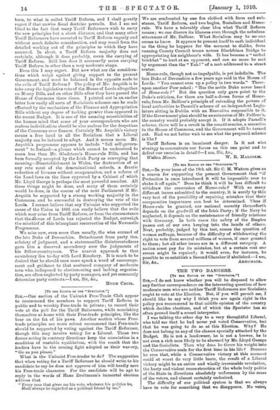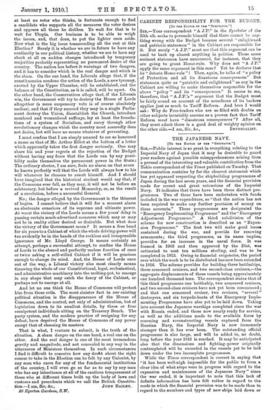ilia' TWO DANGERS. [To ma EmTOZ 07 TIM "SPBCTAT011..'9 Sra,—I
do not know whether you will be disposed to allow any further correspondence on the interesting question of how moderate men who are neither Tariff Reformers nor Socialists ought to vote at the Election. But, if you will permit me, I should like to say why I think you are again right in the policy you recommend to that middle opinion of the country which decides elections, and of which the Spectator has so often proved itself a sound interpreter.
I was talking the other day to a very thoughtful Liberal,
who told me that he had never yet voted Conservative, but that he was going to do so at this Election. Why ? He does not belong to any of the classes specially attacked by the Budget. He is not a landowner, he is not a brewer, he is not even a rich man likely to be alarmed by Mr. Lloyd George and the Socialists. Then why does he throw his weight into the Conservative scale for the first time in his life ? Because he sees that, while a Conservative victory at this moment could at worst do very little harm, the result of a Liberal victory might be an entire and wholly irrevocable revolution, the hasty and violent reconstruction of the whole body politic of the State in directions absolutely unforeseen by the mass of the voters, and almost certainly undesired.
The difficulty of our political system is that we always have to vote for something that we disapprove. No voter,
at least no voter who thinks, is fortunate enough to find a candidate who supports all the measures the voter desires and opposes all those he dislikes. To wait for that is to wait for Utopia. Our business is to be able to weigh the issues, and, that done, to put the lighter ones aside. Now what is the big issue transcending all the rest at this Election? Surely it is whether we are in future to have any continuity in our political history, whether we are to have any check at all on sudden changes introduced by temporary majorities probably representing no permanent desire of the country. The nation has before it warnings of two dangers, and it has to consider which is the real danger and which is the sham. On the one hand, the Liberals allege that, if the constituencies condone the action of the Lords, a new tyranny, exerted by the Upper Chamber, will be established, and the balance of the Constitution, as it is called, will be upset. On the other hand, the Conservatives allege that, if the Liberals -win, the Government will try to destroy the House of Lords altogether (a mere suspensory vote is of course absolutely useless), and that if they succeed they may in a single Parlia- ment destroy the Union, disestablish the Church, introduce manhood and womanhood suffrage, lay at least the founda- tions of a system of Socialism, and carry through other revolutionary changes which the country most assuredly does not desire, but will have no means whatever of preventing.
I must confess that I am simply amazed to see so honoured a name as that of Mr. Arthur Elliot at the bottom of a letter which apparently takes the first danger seriously. One may share his and your regrets at the rejection of the Budget without having any fears that the Lords can by any possi- bility make themselves the paramount power in the State.; The ordinary elector, I am sure, feels no alarm on that score he knows perfectly well that the Lords will always bow to his will whenever he chooses to assert himself. And I should have imagined that the historical student would say that, if the Commons ever fall, as they may, it will not be before an aristocracy, but before a revived Monarchy, or, as the result of a revolution, before a successful GeneraL
No ; the danger alleged by the Government is the thinnest of bogies. I cannot believe that it will for a moment alarm an electorate conscious of its supreme and ultimate power. At worst the victory of the Lords means a few years' delay in passing certain much-advertised measures which may or may not be in reality either desired or desirable. But what does the victory of the Government mean P It means a free hand for six years to a Cabinet of which the whole driving-power will too evidently be in the hands of the reckless and irresponsible ignorance of Mr. Lloyd George. It means certainly an attempt, perhaps a successful attempt, to confine the House of Lords to the absurd and perfectly useless function of once or twice asking a self-willed Cabinet if it will be gracious enough to change its mind. And, the House of Lords once out of the way, a Liberal victory also most clearly means throwing the whole of our Constitutional, legal, ecclesiastical, and administrative machinery into the melting-pot, to emerge in any shape that may catch the fancy of the Cabinet, or perhaps not to emerge at all.
And let no one think the House of Commons will protect him from these evils. The most sinister fact in our existing political situation is the disappearance of the House of Commons, and the control, not only of administration, but of legislation down to its smallest details, by three or four omnipotent individuals sitting on the Treasury Bench. The party system, and the modern practice of resigning for any defeat, have deprived the House of Commons of any power except that of choosing its masters.
That is what, I venture to submit, is the truth of the situation. A sham danger on the one hand, a real one on the other. And the real danger is one of the most tremendous gravity and magnitude, and not concealed in any way in the utterances of Ministers themselves. In such circumstances I find it difficult to conceive how any doubt about the right course to take in the Election can be felt by any Unionist, by any man who cares for any of the fundamental institutions of the country, I will even go so fax as to say by any man who has any inheritance at all of the cautious temperament of those who at different times built up the body of laws and customs and precedents which we call the British Constitu-















































 Previous page
Previous page